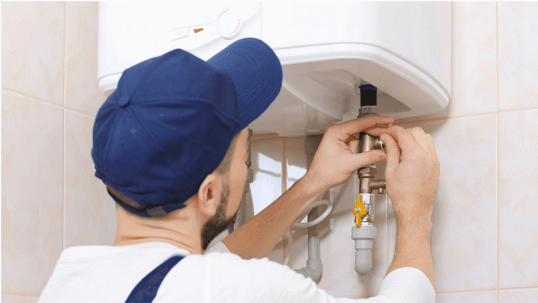Key Heater Issues
Key Heater Issues
Blog Article
What're your thoughts and feelings on Water Heaters Problems?

Visualize starting your day without your routine warm shower. That already sets a bad tone for the remainder of your day.
Every house requires a reliable water heater, but just a few recognize exactly how to handle one. One very easy means to keep your water heater in top form is to look for mistakes on a regular basis and fix them as soon as they show up.
Keep in mind to switch off your hot water heater prior to smelling around for faults. These are the water heater faults you are more than likely to come across.
Water also hot or also cold
Every water heater has a thermostat that identifies just how warm the water gets. If the water coming into your home is too hot despite establishing a hassle-free maximum temperature level, your thermostat might be damaged.
On the other hand, too cold water might be due to a failed thermostat, a broken circuit, or improper gas flow. For instance, if you make use of a gas hot water heater with a broken pilot light, you would get cold water, even if the thermostat is in ideal condition. For electrical heating units, a blown fuse might be the offender.
Inadequate warm water
Water heaters come in several dimensions, relying on your warm water demands. If you run out of warm water before everybody has had a bath, your water heater is as well little for your family size. You ought to consider setting up a bigger hot water heater storage tank or selecting a tankless hot water heater, which occupies much less space and is extra durable.
Strange noises
There go to least five type of sounds you can learn through a hot water heater, but the most common analysis is that it's time for the water heater to retire.
Firstly, you ought to know with the regular seems a water heater makes. An electric heating unit might sound various from a gas-powered one.
Popping or banging sounds usually imply there is a slab of sediment in your containers, and it's time to cleanse it out. On the other hand, whistling or hissing audios may simply be your shutoffs letting some stress off.
Water leakages
Leaks could come from pipes, water connections, valves, or in the worst-case situation, the container itself. Gradually, water will certainly corrode the tank, and locate its escape. If this occurs, you require to replace your water heater as soon as possible.
Nonetheless, before your adjustment your entire storage tank, make certain that all pipes are in place and that each valve functions completely. If you still need help identifying a leakage, call your plumber.
Rust-colored water
Rust-colored water indicates among your hot water heater elements is corroded. It could be the anode rod, or the container itself. Your plumber will certainly be able to determine which it is.
Warm water
No matter exactly how high you established the thermostat, you won't obtain any type of warm water out of a heating system well past its prime. A hot water heater's performance may lower with time.
You will certainly likewise obtain warm water if your pipelines have a cross link. This suggests that when you turn on a tap, hot water from the heating system moves in together with regular, cold water. A cross link is simple to place. If your warm water taps still follow closing the water heater shutoffs, you have a cross connection.
Discoloured Water
Corrosion is a significant source of filthy or discoloured water. Deterioration within the water container or a failing anode rod could trigger this discolouration. The anode pole secures the tank from rusting on the within and also should be examined annual. Without a rod or a correctly operating anode pole, the hot water swiftly corrodes inside the storage tank. Call an expert water heater specialist to identify if replacing the anode pole will repair the trouble; if not, replace your water heater.
Verdict
Ideally, your hot water heater can last 10 years prior to you need a modification. Nevertheless, after the 10-year mark, you might experience any one of these faults more consistently. Now, you must include a new water heater to your budget plan.
How To Troubleshoot 3 Common Water Heater Problems in Twin Cities
The Water Heater Is Leaking
A leaky cold water inlet valve A loose pipe fitting A leaky temperature and pressure relief valve A corroded anode rod A cracked tank Turn Off Your Water Heater:
Shut off your gas water heater by turning the gas valve on the unit to the “OFF” position. Shut off your electric water by switching its power off at your electrical panel. Look for a two-pole breaker labeled “water heater” and turn it to the “OFF” position. Move the ball valve connected to the water heater to be perpendicular to the piping at a 90° angle. Look for the Leak:
Depending on whether the water is coming from the tank's top or bottom, you’ll want to look for the leak in different locations.
If the leak comes from the top of the tank, carefully look for water escaping from the cold water inlet valve or loose pipe fittings. Rusted hot and cold water valves can have loose connections with the tank, with water leaking out of them.
https://mspplumbingheatingair.com/blog/how-to-troubleshoot-3-common-water-heater-problems
We had been brought to that write-up about Water Heater Repair and Troubleshooting through a friend on another website. Do you know someone else who is in the market for the topic? Please feel free to share it. Thanks a bunch for your time. Visit us again soon.
Overflow? Ring now! Report this page